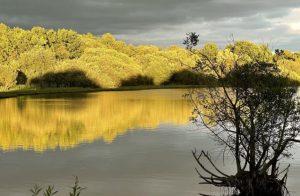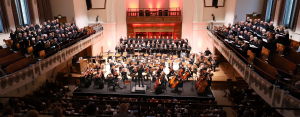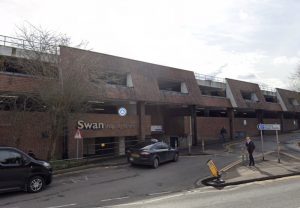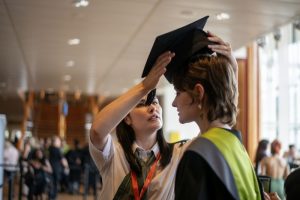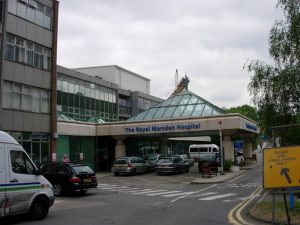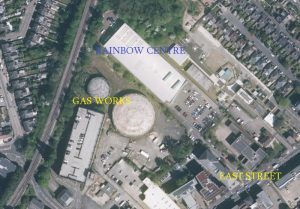Parents say “children and families lives are at stake” after the repeated “failings” by Surrey County Council (SCC) over special needs provision for children. Local authorities are legally obliged to carry out Education, Health and Care (EHC) assessments for children with special needs, and have a statutory duty to deliver special educational provision.
“It needs to be like the Post Office scandal,” said Erika on a rainy morning outside SCC Headquarters Woodhatch Place. Five women gathered outside Woodhatch Place in Reigate to protest against SCC “failing” children with special needs. She said SCC is “flouting the law” and “criminal” for failing to provide EHC plans for many children with special needs.
One parent, Sharren Bridges held a placard of her daughter Jen who committed suicide in 2021, aged just 17. It read: “a multi-agency, systemic failure”, referring to the coroner’s conclusion that SCC, amongst other organisations, failed to ensure Jen’s needs were met which contributed to her tragic death.
Diagnosed with Autism and ADHD at age 10, Jen did not have an EHCP plan which reflected her mental health needs. The coroner also found that opportunities were missed to make an EHCP application at an earlier stage, to ensure she was in better educational setting.
Cllr Clare Curran, (Conservative Fetcham West) Cabinet Member for Children, Families and Lifelong Learning, said in a press statement: “We take the findings from the Coroner extremely seriously and sincerely apologise for any part our services played in Jen Chalkley’s tragic death and the distress of all those who love her. Following the hearing, we are working hard to ensure we learn from the findings and to ensure necessary changes are made as quickly as possible.
“We are resolute in our ambition to improve services and outcomes for children and young people with additional needs and disabilities so that they are happy, healthy, safe and confident about their future.”
Susanne Stonewood, a single mum, has paid more than £12,000 in legal fees fighting for her son’s EHCP. Her son waited 64 weeks (the legal requirement for the process is to be completed within 20 weeks) for an allegedly ‘inappropriate’ EHCP.
She told the Local Democracy Reporting Service (LDRS) outside the SCC meeting that she was informed “in no uncertain terms” by a SEN professional that her son is “too academically and socially vulnerable to ever set foot in a mainstream secondary school”. Going into Year 6, Ms Stonewood is “fighting” to get the EHCP to meet her son’s needs ready for secondary school.
“SCC are blocking the process at every single stage for [educational] provision for their children.”
Parents protesting outside the council offices were also calling for the council’s Director for Children, Families and Lifelong Learning, Rachael Wardell, to hand back her OBE.
Mrs Rachael Wardell, who is also vice president of the Association of Directors of Children’s Services for 2024/25, was awarded an OBE in the King’s Birthday Honours List. She was granted the honour due to her services to children’s social care both inside and out of Surrey.
But parents claim it is under her watch that SCC has dismissed its legal duty to support children with SEND. They argue it would send a devastating message to families and belittle their struggles and legal battles to try and secure the education children are entitled to.
Ms Stonewood said. “We feel it’s inappropriate that Rachael Wardell has been handed an OBE and she should give it back.”
More than 1,900 people signed a petition asking for her OBE award to be blocked. Many parents have commented they feel this has echoes of the Post Office scandal in which Paula Vennells was handed an OBE despite presiding over the Horizon scandal.
Cllr Curran added: “We acknowledge as a council that we have not always got things right for all families and that the service received by some children and young people with additional needs and disabilities has not always been as good as we would like it to have been. We apologise to impacted families for that.
“We are committed to continuing to improve our services and a recent Local Area SEND Inspection found that, although there is more to do, the right actions are being taken and we are starting to see progress.
Councillors Fiona White (Lib Dem/Guildford West) and Cllr Robert Evans OBE (Labour/Stanwell and Stanwell Moor) praised Mrs Wardell and Leader Tim Oliver in Surrey’s full council meeting on July 9.
Meanwhile, Cllr Joanne Sexton (Residents’ Association/Ashford) said parents and carers in her borough were “appalled that Surrey received an honour in the King’s birthday honours list.” She said that residents in her borough have shared their struggles with her, particularly with the fight for children’s education despite clear legislation meant to support them.
Cllr Sexton spoke of parents’ and carers’ “fight against the council which continues to fail to meet its legal and moral obligations”. She added that parents win 97% of legal cases, “highlighting the council’s systemic failure to comply within the law”. Ending her statement at the council, Cllr Sexton was greeted with a round of applause from other members.
SCC has seen a 64% increase in EHCP needs assessment requests across Surrey since 2020, at a time of a national shortage of educational psychologists, and this has naturally had an impact.
Cllr Curran said they have been prioritising the timeliness of statutory assessments through additional investment and focussed work with families. The service has reduced the number of delayed EHCP requests from 1,658 in October 2023 to 56 by the end of June 2024. SCC said it has also issued over 1,500 new EHCPs this year up to the end of June.
She added: “53% of EHCPs issued in May were done so within the statutory 20 week timescale, returning Surrey rates to above the 2023 national average of 50%. We are striving to improve this further over the next few months and are aiming to reach 70% timeliness during the autumn term.”
SCC was invited to comment on campaigners calling for Rachael Wardell to give back her recently-awarded OBE.
Related reports:
King’s Gongs for Surrey leaders
Council pays £3,900 to mother of SEND child
Surrey County failed SEND boy
Image: Parents protesting Surrey County Council\’s special needs provision. (Credit: Emily Dalton/LDRS)


